God's Redemptive Plan
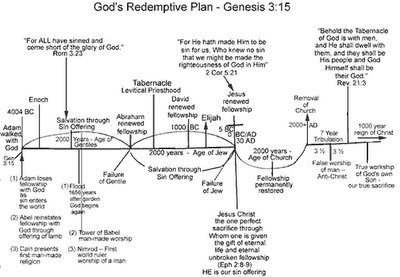
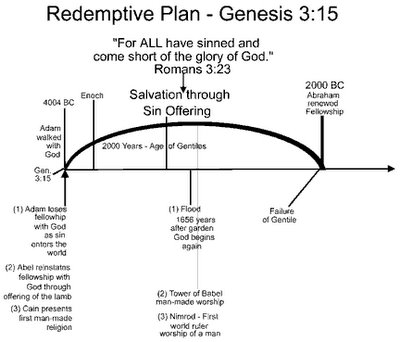
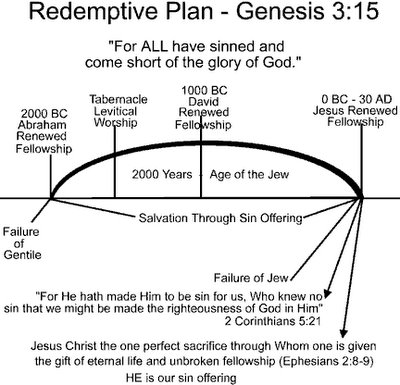
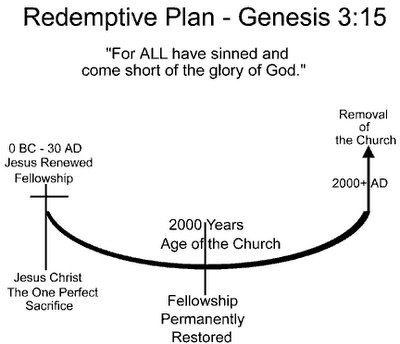
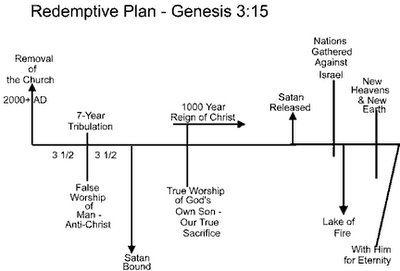
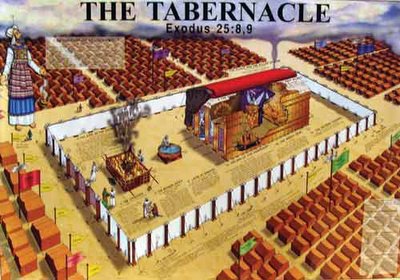
THE WAGES OF SIN IS DEATH
In the Garden of Eden, God told Adam that if he ate from the tree of the knowledge of good and evil, he would die. (Genesis 2:17). God set down His rules and Adam disobeyed. When Adam ate from the tree, God had to follow through with His punishment.
Suppose a teacher has a rule that anyone who cheats on a test, receives an automatic failing grade. All students know the consequence of cheating on the test. Therefore, when someone cheats, they can expect a failing grade. If the teacher doesn't follow through with those consequences, the teacher compromises his position. A teacher who doesn't do what he says, cannot be trusted.
If God didn't follow through with His punishment, God would be compromising His nature, and we could no longer believe or trust Him. God set up the rules, and the rules stated that if Adam sinned, he would die. All of Adam's descendants are sinful and unholy (Isaiah 59:3; Romans 3:23) and cannot be in the presence of the Holy God unless that unholiness is taken away. Therefore, all people need to atone for the sin in order to approach God or they will die. (Leviticus 16:1-2; Hebrews 10:26-31)
WHY BLOOD?
Death was the punishment God laid out to Adam, and God mercifully allowed an animal to temporarily take the place of the sinner. (Genesis 4:3-7; Leviticus 1) The blood of this animal sacrifice atoned, or took away, sin (Leviticus 17:11), making it possible for the worshipper to enter into God's presence. (Leviticus 16:16) Ultimately, the blood of Jesus Christ atones, or takes away, one's sins once and for all. (Hebrews 10:10)
WHY A TEMPLE or A TABERNACLE?
David desired to build a "house of rest for the ark of the covenant" and for the "footstool of God." (1 Chronicles 18:2) What David meant was he wanted to create a place where God could meet with His people.
Solomon's Temple was a place where the people would come and offer sacrifices of atonement in order to meet with God.
At the Temple's dedication, Solomon humbly said that even the heavens could not contain God, let alone the Temple he had built. (1 Kings 2:27)
Solomon let the people know that God had not been, was not currently, and would never be confined to any physical structure on earth.
Solomon declared that the God of Israel is omnipresent (everywhere) and transcendent (above all creation) and this reminded the people that God is unlike the pagan gods, and the Temple is also unlike the pagan temples.
For pagans, their temple contained an idol and was the place where their god lived. This was not the case for Solomon's Temple. God does not live in a temple made with hands. (1 Corinthians 6:19)
The "footstool of God" (1 Chronicles 28:2) was a place for people to meet and worship God once they had made atonement for their sins. (Psalm 132:7)
SACRIFICE (see # 1 below)

For all sacrifices, including the sacrifices made on the Day of Atonement, goats, doves, bulls and lambs were killed and their life blood was drained. God said that the life of a creature is in the blood and that the blood makes an atonement for one's life. (Leviticus 17:11) The blood was collected and sprinkled upon the horns of the altar and upon its base. (Leviticus 4)
The meat was the food for the priests and for the family offering the sacrifice. Just the fat and the entrails were burned.
The English the verb "sacrifice" means something entirely different from what it means in Hebrew:
The Hebrew word for "sacrifice" (korban) is from the same root as "to come near, to approach, to become closely involved in a relationship with someone." No word in the English language can adequately render the idea behind the Hebrew word “korban”.
If the definition of the korban is "to come closer," then the goal of the sacrifice is the aim of bringing the person doing the offering closer to the Creator and the source of all life. The sacrifice is not an idea of giving something up or losing something of value; it strives for nearness to God. For as King David prayed in the book of Psalms (73:28), "But as for me, how good it is to be near God!" In a sense, what happens to the offering is also taking place within the heart and mind of he who brings it.
This is part of the concept of the Temple sacrifices as well. For when an individual sinned and brought a korban, the death and burning of the animal on the Temple altar gave him a strong visual symbolization of what he himself deserves, were God to judge him severely, with the exacting scrutiny of unmitigated justice. Throughout the book of Leviticus, in reference to the offerings, God never refers to Himself with the Name “Elohim”, which denotes the Divine attribute of strict justice. For when connected to the sacrifices this could be misconstrued to indicate that the God who commands these offerings does so as a vengeful, bloodthirsty deity who demands a sacrifice as reparation. The only Name that the Bible associates with the offerings to God is HaShem, YHVH - signaling the attribute of Divine love and mercy.
The Sacrifices are Meaningless Without Repentance.
It was only in the Temple that the full spiritual nature of this process could be appreciated. The sacrifices did not serve as an end in themselves. For example, the sin offering, which was a minority of all the offerings brought in the Temple, was powerless to atone for sin unless it was accompanied by a thought of resolute, true repentance. Without repentance, the sacrifice was invalid; the korban itself was only a means by which man could arouse himself to repent. God would prefer that man not sin, and not be necessitated to bring any offering.
If these sacrifices in the past actually atoned for the people’s sins, then they would be equally blasphemous in light of Christ's perfect sacrifice. Hebrews 10:4 tells us, "…it is not possible for the blood of bulls and goats to take away sins." Furthermore, there would have been no need for Christ's once and for all atoning sacrifice if these past acts did the job.
Isaiah 1:11-20 - "I am sick of your sacrifices," says the LORD. "Don't bring me any more burnt offerings! I don't want the fat from your rams or other animals. I don't want to see the blood from your offerings of bulls and rams and goats. Why do you keep parading through my courts with your worthless sacrifices? … I cannot stand the sight of them! From now on, when you lift up your hands in prayer, I will refuse to look. Even though you offer many prayers, I will not listen. For your hands are covered with the blood of your innocent victims. Wash yourselves and be clean! Let me no longer see your evil deeds. Give up your wicked ways … "No matter how deep the stain of your sins, I can remove it. I can make you as clean as freshly fallen snow. Even if you are stained as red as crimson, I can make you as white as wool. If you will only obey me and let me help you, then you will have plenty to eat. But if you keep turning away and refusing to listen, you will be destroyed by your enemies. I, the LORD, have spoken!"
Hebrews 9:11-14 - So Christ has now become the High Priest over all the good things that have come. He has entered that great, perfect sanctuary in heaven, not made by human hands and not part of this created world. Once for all time he took blood into that Most Holy Place, but not the blood of goats and calves. He took his own blood, and with it he secured our salvation forever. Under the old system, the blood of goats and bulls and the ashes of a young cow could cleanse people's bodies from ritual defilement. Just think how much more the blood of Christ will purify our hearts from deeds that lead to death so that we can worship the living God. For by the power of the eternal Spirit, Christ offered himself to God as a perfect sacrifice for our sins.
THE SCAPEGOAT (see # 2 above)
Once a year, on the Day of Atonement, the High Priest was to lay both hands on the head of the live goat and confess over it all the wickedness and rebellion of the people and the goat would carry on itself all their sins. (Leviticus 16:18-22) In this case, the "scapegoat" carried their sins out to the desert and was released. Several other sacrifices were made on the Day of Atonement.
THE MOST HOLY PLACE (see # 3 above)
On the Day of Atonement, the High Priest also entered the Most Holy Place (Holy of Holies). He brought the blood from the sacrifice which atoned for a repentant people and then placed (sprinkled) the blood upon the throne of God, the "mercy seat", between the two cherubim. (Exodus 25:22)
The Bible speaks of Jesus Christ as a sacrifice for us. (Ephesians 5:21) We hear quite a bit about the blood of Jesus, and sometimes this is tied in with the idea that Jesus was suffering a punishment from God for our sins. Some people think of sacrifice as a way of escaping God's punishment by letting it fall symbolically upon a sacrificial animal. This same idea is applied by some to Jesus Christ as One who took on Himself God's penalty for all our sins, and so reconciled God to us by satisfying God's "justice". The idea that Christ was punished, however, is not actually taught in the Bible, although He was in a symbolic sense a sacrifice.
Sacrifice is actually a symbol of holiness rather than punishment. God is loving and merciful, and has no desire to see either human or animal suffering. When we sin, we are not reconciled to God through punishment, but by repenting and living a good life. The sacrifice is then a symbol of our desire to repent and dedicate our life to God. Christ was symbolically a sacrifice because He purified and sanctified Himself by His holy life. He is symbolically our sacrifice because He enables us to life a holy life.
How Is Christ Our Atonement?
"Atonement" has no connection with punishment. It comes from "at-one-ment" and simply means "making one" or "reconciliation." In fact, "atonement" and "reconciliation" are the same word in the Greek. We might ask, Who was reconciled - God or the human race? The Bible's answer is the human race. "God was in Christ, reconciling the world to Himself." (2 Corinthians 5:19) We receive "at-one-ment", never God. "We were reconciled to God by the death of His Son.... We have received atonement" (Romans 5:10-11)
Romans 12:1 – “And so, dear brothers and sisters, I plead with you to give your bodies to God. Let them be a living and holy sacrifice--the kind he will accept. When you think of what he has done for you, is this too much to ask?”
REFLECTING ON ATONEMENT
1. What happens to people if they don't atone for their sin? (Romans 6:23)
2. How did Israel atone for their sins? (Leviticus 17:1)
3. Who atones for sins now? (Hebrews 9:11-14; 10:10)
4. Why did David want to build the Temple? (1 Chronicles 28:2)
5. What is the scapegoat and what did it symbolize? (Leviticus 16:18-22)
6. What does it mean to be a “living sacrifice”? (Romans 12:1)

